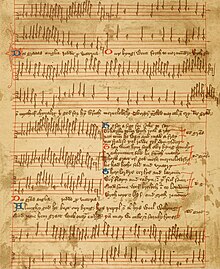We visited The Second Shepherds’ Play while they were rehearsing ‘Somerset Wassail,’ but that is only one of the beautiful, festive songs which appears in this production. Today, we hear from Folger Consort Co-Artistic Director Robert Eisenstein, and give you an advance listen to some of the tunes you will hear when The Second Shepherds’ Play takes the stage on November 27th.
From Robert Eisenstein:
When we decided to stage a version of The Second Shepherds’ Play as part of the Folger Consort season originally in 2007, we realized we had a major hurdle to surmount: there is only one reference to a song in the play, and it is impossible to know for sure what tune was used. Music was an integral part of medieval life in so many ways and what we know of the performing tradition makes it easy to imagine a 15th- or early 16th-century performance of the play that incorporates songs and instrumental music. We first thought to use music from many different periods and even different countries, but as we explored this more closely we saw it made more sense to use songs and instrumental pieces that the original author of the play could have known. All of the music you will hear in this performance is English, and all of it is from the 16th century or earlier. As is befitting a work that celebrates simple shepherds, a lot of our selections have a decidedly popular tone. There is little lofty court or chapel music here.
Click here to listen to the 2007 recording of Somerset Wassail.

Part of the Trinity Roll, which also contained a version of ‘Nowell, Nowell’
In England of the early 15th century, the Church had not completely succeeded in its struggle against native paganism, especially among the common people. The medieval Church dealt with this problem in many ways. Some customs, such as the hanging of wreaths of mistletoe and ivy, were simply absorbed and became integral parts of popular Christianity. To reach the masses, however, the Church had to use every possible attraction. Important feasts, especially Christmas, were made as elaborate and eye-catching as possible, with colorful processions and music to ornament the liturgy. The first Christmas carols had their origins here. Their basic purpose was to involve the people in the Church through instructive texts, beautiful melodies, and dance-like rhythms. The word carole in previous centuries referred to a dance song, and that character still seems present in many examples from the 13th century. We have used several of these carols in our production this evening, including the opening Nova, Nova as well as Nowell, Nowell.
Click here to listen to the 2007 recording of Nova, Nova.
After the group of 15th-century carols heard after intermission, we introduce some later tunes. There is a wonderful progression to the play and the gradual appearance of some 16th-century music helps with the transformation and wonder of the later scenes. You will hear, among the earlier tunes, the lovely anonymous lute ayre Sweet was the song the Virgin sung, first the tune alone and then with the accompaniment, the justly famous Coventry Carol with its expressive cross relations, and Dives and Lazarus, the ravishing folk song collected and set by R.V. Williams in the early 20th century.

Robert Eisenstein (center) with Folger Consort, The Second Shepherds’ Play, 2007. Photo: Carol Pratt.
Why does medieval music continue to fascinate performers and the listening public? Medieval music is an exotic echo of distant times, and reminds us of romanticized or realistic visions of castles, knights and ladies, tournaments and chivalry, and so on. Some are moved by the fervor and certainty expressed in religious texts from a time of more absolute faith. Many have pointed out “New Age” and minimalist connections to certain styles of medieval music, especially as presented by certain performers and recording companies.
But perhaps the best reason is that there simply is so much good music from the Middle Ages. Old does not mean inferior or less sophisticated. There is a strength and power in these tunes, words, and forms that still speaks directly to us, perhaps in ways that later music has neglected in favor of other charms.
Curious to learn more? An expanded version of this essay appears in The Second Shepherds’ Play program, and you can click here to listen to Eisenstein discuss staging the 2007 production with adaptor/director Mary Hall Surface.
 Want to take your turn singing a yuletide tune? Join Folger Consort on December 10 and December 17 at 1pm for Community Sing, a free program where you can learn music from The Second Shepherds’ Play from members of the cast. Reservations are suggested.
Want to take your turn singing a yuletide tune? Join Folger Consort on December 10 and December 17 at 1pm for Community Sing, a free program where you can learn music from The Second Shepherds’ Play from members of the cast. Reservations are suggested.
The Second Shepherds’ Play is on stage November 27 – December 21. For tickets and more information, visit us online or call the Folger Box Office at 202.544.7077.
Stay connected
Enter your email address to follow this blog and receive notifications of new posts by email.


